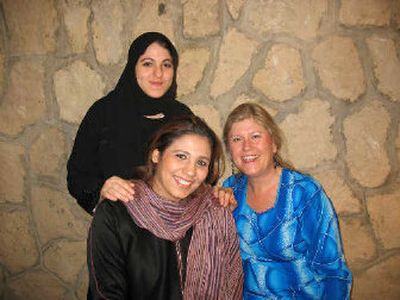Mideast concert series strikes note of hope

One morning last December, EWU piano professor Jody Graves was drinking a cup of coffee when her phone rang.
It was the cultural attaché from the American embassy in Bahrain. He called to ask if she’d consider flying to the Arabian Peninsula to perform.
Soon she was on the phone with her friends in the Sapphire Trio, former colleagues at the University of Montana, Margaret Baldridge, a violinist, and Maxine Ramey, who plays clarinet. When she said, “We have a concert in the Middle East,” she first heard silence on the other end.
It would mean flying right into the most unstable region in the world, calling doctors for hepatitis shots and tracking down Web sites to order Muslim clothing and a colorful hijab to cover Graves’ long blond mane. And once they arrived, there would be armored vehicles, soldiers bearing automatic weapons and concerts in compounds with barbed wire, thick concrete walls and bullet-proof glass. Graves, a fearless woman who believes Americans shouldn’t be killing people, said, “Let’s go.”
And so on May 11, they went. Their itinerary included Bahrain, Qatar, Saudi Arabia and Kuwait, where they played American music such as Gershwin’s “Rhapsody in Blue” and a medley from “The Wizard of Oz.”
Television cameras and news reporters followed Graves and her friends throughout the region, except in Saudi Arabia, where their visit was largely kept secret. Muslim women seldom perform music publicly in this part of the world, and in Saudi, religious leaders frown on music, believing it distracts from the worship of God. So the American women’s 14 concerts and lecture recitals in 12 days struck Arab journalists as major news.
As the women crossed the border into Saudi, they hid the clarinet and the violin under the car seat. When Graves waited in the hotel lobby, unescorted and without a long black abaya covering her clothing, she felt the stares of Arab men. It was as if a lion, some wild creature, had suddenly appeared in that room.
In Saudi the trio performed a concert for an all-women audience. The Arab women wore burqas over their faces and rode in cars with chauffeurs, because they aren’t allowed to drive. After they threw off their outer robes, the women told the trio that if their status is to change in their country, it will be the women who will change it.
Many Saudi women had heard the piano on satellite television, but had never seen the instrument in person. One young woman told Graves, “Your music gives my heart hope.”
Graves invited her to sit on the piano bench and to arrange her hands on the black keys. “It was like she was touching the cheek of a baby,” Graves said.
“(Afterward) she went back to her repressive life where she’s not allowed to play music. But it’s her dream.”
The concerts in Bahrain, Qatar and Kuwait were freer. In Bahrain, a conservative newspaper columnist wrote that the trio had put a whole new face on America. “These are the types of ambassadors we would like to see America send to our region, its ambassadors of arts and culture, not its Marines and bloodshed,” the columnist wrote.
An American soldier who had just flown away from the violence in Baghdad a few hours earlier attended one concert. “You took me from a place of horror to a place that is normal that I had forgotten,” he told Graves afterward. “The music made my heart beat slower for the first time that I can remember.”
On the last night, the trio performed in Kuwait City, less than 100 miles from Iraq. An Arab man wearing a long, white dishdasha stood up in the audience and asked Graves to sing. She hadn’t expected that, but in the moment, the contemporary words of an old American hymn came to her. She changed one word in the title, from “I” to “we,” and as the sun set and the shadows deepened, she sang two verses a cappella to the crowd of 200 Muslims. She concluded,
“And though the tempest around me roars/ I hear the truth it lives,
And though the darkness round me close, /Songs in the night it gives.
No storm can shake my inmost calm, /While to that rock I’m clinging
If love abounds on heaven and earth, / How can we keep from singing?”
As her song ended, she looked down to see people weep.